I found a couple of those DC Comics Presents issues.
DC Comics Presents #28 (December 1980) was written by Len Wein, drawn by Jim Starlin and Romeo Tanghal, and edited by Julius Schwartz. It opens with Superman and Supergirl on the trail of Mongul and his Death Star knockoff "Warworld." Say, wouldn't last issue's guest star, J'Onn J'Onzz, have been good to bring along? Well, Supergirl's helpful exposition tells us that in order to get Warworld's Crystal Key, Mongul kidnapped Lois Lane, Jimmy Olsen, and Steve Lombard to force Superman into fighting J'Onn for it. (Steve was the office jackhole, but I guess two out of three was good enough for Supes.) The implication is that the fight took so much out of Supes and J'Onn that although J'Onn took the worst of it, Supes still had to call in Supergirl.
Like I said before, I didn't buy much DC Presents as a youngster. I'm confident I bought this one because I wanted to see what could have been so important that it needed Supergirl's help. I was not disappointed. This issue revels in that very notion, making Warworld bigger, badder, and meaner than just about anything either Super-cousin had yet encountered. What's more, it does so almost playfully, using variations on the same trick of perspective to convey the enormity of Warworld's various dangers.
Here's the first sighting of Warworld:
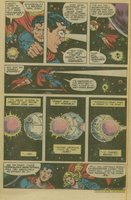
I'm sure that sequence only pays lip service to physics (like much of this issue and the next) but it's still pretty impressive. (And even though Warworld could eat stars for dinner and planets for dessert, as we can see from panel 5, it would do so with a smile. Just an indication, I suppose, that in the end the creators still have a sense of humor.)
Telescopic vision gets a good workout on the next page, as Superman and Supergirl analyze every detail of Warworld, from its weapons to its computers to the mountain of graves outside its main city. Although the page suggests that Kryptonian eyes could practically read Mongul's driver's license from two light-years away, the page after that turns the idea on its head:
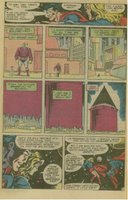 Smiley-face aside, the bigness of Warworld earns our heroes' respect. Naturally, its sensors pick them up, and after Mongul recalls the events that led to his ouster, scratches his itchy trigger finger.
Smiley-face aside, the bigness of Warworld earns our heroes' respect. Naturally, its sensors pick them up, and after Mongul recalls the events that led to his ouster, scratches his itchy trigger finger.
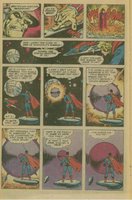 This next page really captures the flavor of the issue. Not only is it another exercise in perspective, it has Superman shooing Supergirl away so he can "test" the potency of a mountain-sized missile. Superman's already given Supergirl a warning about the limits of invulnerability, and once again he takes the big-brother role. To him it makes perfect sense, because although they are pretty equal in power and ability, he's more experienced, she's too impulsive, etc. It almost make Superman look condescending. However, it does set up the last panel....
This next page really captures the flavor of the issue. Not only is it another exercise in perspective, it has Superman shooing Supergirl away so he can "test" the potency of a mountain-sized missile. Superman's already given Supergirl a warning about the limits of invulnerability, and once again he takes the big-brother role. To him it makes perfect sense, because although they are pretty equal in power and ability, he's more experienced, she's too impulsive, etc. It almost make Superman look condescending. However, it does set up the last panel....
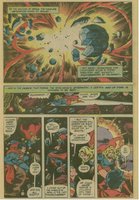 This page ends with a variation on the same gag, but it hasn't gotten old yet. Again, it reinforces the point that the Kryptonians can't match Warworld for straight-ahead brute force, so Supes decides to employ some "strategery." The cousins make Warworld work overtime to try and kill them, which ends up overloading the cybernetic controls plugged into Mongul's brain, and Mongul keels over. Given that Supes got the idea from the mountain of graves next to the control center, this seems a bit outside his usual ethics. Still, Supergirl's telescopic vision confirms that Mongul is just unconscious, and also an organ donor.
This page ends with a variation on the same gag, but it hasn't gotten old yet. Again, it reinforces the point that the Kryptonians can't match Warworld for straight-ahead brute force, so Supes decides to employ some "strategery." The cousins make Warworld work overtime to try and kill them, which ends up overloading the cybernetic controls plugged into Mongul's brain, and Mongul keels over. Given that Supes got the idea from the mountain of graves next to the control center, this seems a bit outside his usual ethics. Still, Supergirl's telescopic vision confirms that Mongul is just unconscious, and also an organ donor.
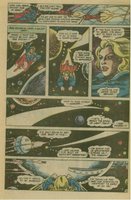
Unfortunately, Mongul's incapacitation has the opposite effect -- Warworld goes off on automatic. Change in plans: while Superman distracts it, Supergirl aims to punch a hole through it by moving faster than its sensors can follow. There's nothing technically adept about this next page, but I couldn't resist another shot of the deadliest smile in the galaxy.
Supergirl's feat allows Superman to fly into Warworld's computer core and reprogram it for self-destruct. Mysteriously, Mongul's not around to slow Superman down as he escapes. Warworld blows up, but now there's a new problem -- where's Supergirl?
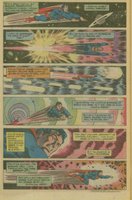 DC Presents #29, by the same creative team, finds Superman tracing his cousin's trajectory. Problem is, she was moving so fast that she's probably way ahead of him by now, so he starts going faster and faster, probably not even paying attention to his speed, until...
DC Presents #29, by the same creative team, finds Superman tracing his cousin's trajectory. Problem is, she was moving so fast that she's probably way ahead of him by now, so he starts going faster and faster, probably not even paying attention to his speed, until...
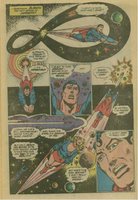 ... he "bursts the very bonds of infinity!" This snaps him back to reality (so to speak), but before he can try to get back to his "own universe," there's Supergirl, up ahead. On he goes, but not too far, before he literally runs into the Spectre.
... he "bursts the very bonds of infinity!" This snaps him back to reality (so to speak), but before he can try to get back to his "own universe," there's Supergirl, up ahead. On he goes, but not too far, before he literally runs into the Spectre.
Spectre won't let Superman catch up to Supergirl, so Supes tries brute force. No good. He tries to outrun the Spectre, but again, Spectre is faster. Growing until he dwarfs Superman, the Spectre picks Supes up by his cape and intones, "You are one of the most powerful beings in all of creation -- and yet, in so many ways, you are little more than a child! There is so much you have yet to learn ... perhaps it is time your education begin in earnest!"
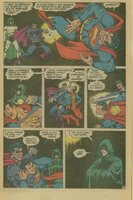 Spectre shows Superman Jor-El's futile attempts to save Krypton, which Superman imitates with similar results. Spectre then shows Superman literally unable to save Jonathan Kent from the Grim Reaper. Finally, three years before Superman III, Spectre has Superman's dark side attack him. Dark Supes is "pure, unadulterated power, without rein, without restriction ... without conscience or remorse ... power that can ultimately destroy you ... if you allow it to run amok!" What to do?
Spectre shows Superman Jor-El's futile attempts to save Krypton, which Superman imitates with similar results. Spectre then shows Superman literally unable to save Jonathan Kent from the Grim Reaper. Finally, three years before Superman III, Spectre has Superman's dark side attack him. Dark Supes is "pure, unadulterated power, without rein, without restriction ... without conscience or remorse ... power that can ultimately destroy you ... if you allow it to run amok!" What to do?
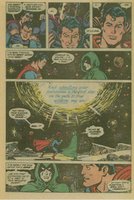 Superman's sarcastic observation turns into a moment of reflection which allows him to see that he's been thinking with his heart, not his head. The Spectre's boss also makes an appearance, more or less, blessing Supes' newfound clarity.
Superman's sarcastic observation turns into a moment of reflection which allows him to see that he's been thinking with his heart, not his head. The Spectre's boss also makes an appearance, more or less, blessing Supes' newfound clarity.
Still, why did Spectre stop Supes from catching Supergirl? The answer is that Superman was "traveling far faster than [he] ever had before ... shattering barrier after barrier until only one remained ... that golden veil beyond which no living man may trespass!" Somehow, according to the Spectre, that "risked the ultimate destruction of civilizations beyond numbering!" Either that means Superman was going to kill himself -- thereby depriving said civilizations of a protector -- or by breaking the "heaven barrier" he would have released some ultra-powerful cosmic energy. In other words, don't cross the streams.
Anyway, Supergirl turns up fine, Superman has learned a valuable lesson, and everyone goes away happy. The End.
Now, clearly this is not the most serious examination of the implications of the Earth-1 Superman's power, but I like these issues because they go from reverence to irreverence and back again. The Warworld attacks in #28 manage to be both suspenseful and over-the-top, and the amount of power being thrown around there sets up the deeper discussion of #29. I'm sure there have been other Superman stories questioning why he can't be everywhere and save everybody, but this one handled the question briefly and well. You say there's nothing too powerful for Superman, let alone Supes and Supergirl? Wein and Starlin cheerfully present Warworld. Well, what about the potential abuse of that power? Wein and Starlin use the Spectre to remind Superman that vast though it may be, there are limits, self-imposed and otherwise, on his power.
In hindsight, of course, these issues help reinforce the impact of Supergirl's death in Crisis on Infinite Earths. They show the Kryptonian cousins in their prime, and especially present Supergirl as a happy warrior, more eager and exuberant than Superman. It's easy to see the Supergirl of DCCP #28 charging at the Anti-Monitor, which makes it all the sadder to see the Superman of COIE unable to bring her back one last time. One only hopes that in his mourning, he remembered the lessons the Spectre taught him just a few years before.
DC Comics Presents #28 (December 1980) was written by Len Wein, drawn by Jim Starlin and Romeo Tanghal, and edited by Julius Schwartz. It opens with Superman and Supergirl on the trail of Mongul and his Death Star knockoff "Warworld." Say, wouldn't last issue's guest star, J'Onn J'Onzz, have been good to bring along? Well, Supergirl's helpful exposition tells us that in order to get Warworld's Crystal Key, Mongul kidnapped Lois Lane, Jimmy Olsen, and Steve Lombard to force Superman into fighting J'Onn for it. (Steve was the office jackhole, but I guess two out of three was good enough for Supes.) The implication is that the fight took so much out of Supes and J'Onn that although J'Onn took the worst of it, Supes still had to call in Supergirl.
Like I said before, I didn't buy much DC Presents as a youngster. I'm confident I bought this one because I wanted to see what could have been so important that it needed Supergirl's help. I was not disappointed. This issue revels in that very notion, making Warworld bigger, badder, and meaner than just about anything either Super-cousin had yet encountered. What's more, it does so almost playfully, using variations on the same trick of perspective to convey the enormity of Warworld's various dangers.
Here's the first sighting of Warworld:

I'm sure that sequence only pays lip service to physics (like much of this issue and the next) but it's still pretty impressive. (And even though Warworld could eat stars for dinner and planets for dessert, as we can see from panel 5, it would do so with a smile. Just an indication, I suppose, that in the end the creators still have a sense of humor.)
Telescopic vision gets a good workout on the next page, as Superman and Supergirl analyze every detail of Warworld, from its weapons to its computers to the mountain of graves outside its main city. Although the page suggests that Kryptonian eyes could practically read Mongul's driver's license from two light-years away, the page after that turns the idea on its head:
 Smiley-face aside, the bigness of Warworld earns our heroes' respect. Naturally, its sensors pick them up, and after Mongul recalls the events that led to his ouster, scratches his itchy trigger finger.
Smiley-face aside, the bigness of Warworld earns our heroes' respect. Naturally, its sensors pick them up, and after Mongul recalls the events that led to his ouster, scratches his itchy trigger finger. This next page really captures the flavor of the issue. Not only is it another exercise in perspective, it has Superman shooing Supergirl away so he can "test" the potency of a mountain-sized missile. Superman's already given Supergirl a warning about the limits of invulnerability, and once again he takes the big-brother role. To him it makes perfect sense, because although they are pretty equal in power and ability, he's more experienced, she's too impulsive, etc. It almost make Superman look condescending. However, it does set up the last panel....
This next page really captures the flavor of the issue. Not only is it another exercise in perspective, it has Superman shooing Supergirl away so he can "test" the potency of a mountain-sized missile. Superman's already given Supergirl a warning about the limits of invulnerability, and once again he takes the big-brother role. To him it makes perfect sense, because although they are pretty equal in power and ability, he's more experienced, she's too impulsive, etc. It almost make Superman look condescending. However, it does set up the last panel.... This page ends with a variation on the same gag, but it hasn't gotten old yet. Again, it reinforces the point that the Kryptonians can't match Warworld for straight-ahead brute force, so Supes decides to employ some "strategery." The cousins make Warworld work overtime to try and kill them, which ends up overloading the cybernetic controls plugged into Mongul's brain, and Mongul keels over. Given that Supes got the idea from the mountain of graves next to the control center, this seems a bit outside his usual ethics. Still, Supergirl's telescopic vision confirms that Mongul is just unconscious, and also an organ donor.
This page ends with a variation on the same gag, but it hasn't gotten old yet. Again, it reinforces the point that the Kryptonians can't match Warworld for straight-ahead brute force, so Supes decides to employ some "strategery." The cousins make Warworld work overtime to try and kill them, which ends up overloading the cybernetic controls plugged into Mongul's brain, and Mongul keels over. Given that Supes got the idea from the mountain of graves next to the control center, this seems a bit outside his usual ethics. Still, Supergirl's telescopic vision confirms that Mongul is just unconscious, and also an organ donor.
Unfortunately, Mongul's incapacitation has the opposite effect -- Warworld goes off on automatic. Change in plans: while Superman distracts it, Supergirl aims to punch a hole through it by moving faster than its sensors can follow. There's nothing technically adept about this next page, but I couldn't resist another shot of the deadliest smile in the galaxy.
Supergirl's feat allows Superman to fly into Warworld's computer core and reprogram it for self-destruct. Mysteriously, Mongul's not around to slow Superman down as he escapes. Warworld blows up, but now there's a new problem -- where's Supergirl?
 DC Presents #29, by the same creative team, finds Superman tracing his cousin's trajectory. Problem is, she was moving so fast that she's probably way ahead of him by now, so he starts going faster and faster, probably not even paying attention to his speed, until...
DC Presents #29, by the same creative team, finds Superman tracing his cousin's trajectory. Problem is, she was moving so fast that she's probably way ahead of him by now, so he starts going faster and faster, probably not even paying attention to his speed, until... ... he "bursts the very bonds of infinity!" This snaps him back to reality (so to speak), but before he can try to get back to his "own universe," there's Supergirl, up ahead. On he goes, but not too far, before he literally runs into the Spectre.
... he "bursts the very bonds of infinity!" This snaps him back to reality (so to speak), but before he can try to get back to his "own universe," there's Supergirl, up ahead. On he goes, but not too far, before he literally runs into the Spectre.Spectre won't let Superman catch up to Supergirl, so Supes tries brute force. No good. He tries to outrun the Spectre, but again, Spectre is faster. Growing until he dwarfs Superman, the Spectre picks Supes up by his cape and intones, "You are one of the most powerful beings in all of creation -- and yet, in so many ways, you are little more than a child! There is so much you have yet to learn ... perhaps it is time your education begin in earnest!"
 Spectre shows Superman Jor-El's futile attempts to save Krypton, which Superman imitates with similar results. Spectre then shows Superman literally unable to save Jonathan Kent from the Grim Reaper. Finally, three years before Superman III, Spectre has Superman's dark side attack him. Dark Supes is "pure, unadulterated power, without rein, without restriction ... without conscience or remorse ... power that can ultimately destroy you ... if you allow it to run amok!" What to do?
Spectre shows Superman Jor-El's futile attempts to save Krypton, which Superman imitates with similar results. Spectre then shows Superman literally unable to save Jonathan Kent from the Grim Reaper. Finally, three years before Superman III, Spectre has Superman's dark side attack him. Dark Supes is "pure, unadulterated power, without rein, without restriction ... without conscience or remorse ... power that can ultimately destroy you ... if you allow it to run amok!" What to do? Superman's sarcastic observation turns into a moment of reflection which allows him to see that he's been thinking with his heart, not his head. The Spectre's boss also makes an appearance, more or less, blessing Supes' newfound clarity.
Superman's sarcastic observation turns into a moment of reflection which allows him to see that he's been thinking with his heart, not his head. The Spectre's boss also makes an appearance, more or less, blessing Supes' newfound clarity.Still, why did Spectre stop Supes from catching Supergirl? The answer is that Superman was "traveling far faster than [he] ever had before ... shattering barrier after barrier until only one remained ... that golden veil beyond which no living man may trespass!" Somehow, according to the Spectre, that "risked the ultimate destruction of civilizations beyond numbering!" Either that means Superman was going to kill himself -- thereby depriving said civilizations of a protector -- or by breaking the "heaven barrier" he would have released some ultra-powerful cosmic energy. In other words, don't cross the streams.
Anyway, Supergirl turns up fine, Superman has learned a valuable lesson, and everyone goes away happy. The End.
Now, clearly this is not the most serious examination of the implications of the Earth-1 Superman's power, but I like these issues because they go from reverence to irreverence and back again. The Warworld attacks in #28 manage to be both suspenseful and over-the-top, and the amount of power being thrown around there sets up the deeper discussion of #29. I'm sure there have been other Superman stories questioning why he can't be everywhere and save everybody, but this one handled the question briefly and well. You say there's nothing too powerful for Superman, let alone Supes and Supergirl? Wein and Starlin cheerfully present Warworld. Well, what about the potential abuse of that power? Wein and Starlin use the Spectre to remind Superman that vast though it may be, there are limits, self-imposed and otherwise, on his power.
In hindsight, of course, these issues help reinforce the impact of Supergirl's death in Crisis on Infinite Earths. They show the Kryptonian cousins in their prime, and especially present Supergirl as a happy warrior, more eager and exuberant than Superman. It's easy to see the Supergirl of DCCP #28 charging at the Anti-Monitor, which makes it all the sadder to see the Superman of COIE unable to bring her back one last time. One only hopes that in his mourning, he remembered the lessons the Spectre taught him just a few years before.


3 comments:
I love that story in DC Presents #29. It has such a 'tall tale' quality to it. (Why Superman once went so fast, etc...") Superman is the closet the we get today to American folklore.
I didn't have the pleasure of reading the stories the first time around, but they certainly sum up the elements I loved about pre-Crisis Superman.
He wasn't too powerful, it's the imaginations of readers and writers that were too weak.
P.S. Your blog is great! I'm going to add a link on my own comix site.
i was looking for this everywhere man
thanks for posting thiss
Post a Comment